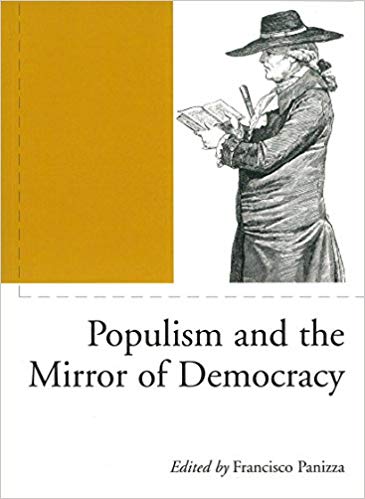The Long View: Populism and the Mirror of Democracy

It has been a while since I've put up one of the orphan posts written by John J. Reilly that he didn't explicitly call out in his main blog. This one is from 2005, and originally appeared in the journal Democratization.
John used the line, “The people have spoken. The bastards.”, but I would have used the Wizard of Id classic, "The peasants are revolting!"

I enjoy this book review because of this useful definition of populism:
“Populism” has no ideological content: “populist movements” can be Left or Right, violent or peaceful, liberal or tyrannical. Nonetheless, certain formal features of some political environments can be usefully defined as populist. Populism is a likely result when the ordinary processes of politics and administration do not address a growing list of demands and dissatisfactions. Various groups of dissatisfied persons can then be persuaded that they are all parts of a single group, the people. In this sense, the “people” is defined by its antagonism to some elite, a minority who prevent the people from achieving plenitude.
The West is in a broadly populist moment, and antagonism to some elite is a widespread emotion, although not every part of the People hates the same elites.
Populism and the Mirror of Democracy
Edited by Francisco Panizza
London: Verso, 2005
Pp. 358; index, bibliography
£15 (paperback)
ISBN 1 85984 489 8
There is an old saying: “The people have spoken. The bastards.” The people, variously defined, have lately been making political establishments around the world say just that. This book explains not so much why this is happening as how.
Ernesto Laclau’s contribution articulates a discourse theory based on Gramsci’s notion of ideological hegemony; the other nine contributors use this framework to analyze populist movements from Alberta to Natal. The semiotological language of the contributors will not be to every reader’s taste (certainly it wasn’t to this reviewer’s), but in all the pieces local knowledge and practical insight compensate for the excesses of theory. The editor, Francisco Panizza of the London School of Economics, provides a clarifying introduction.
“Populism” has no ideological content: “populist movements” can be Left or Right, violent or peaceful, liberal or tyrannical. Nonetheless, certain formal features of some political environments can be usefully defined as populist. Populism is a likely result when the ordinary processes of politics and administration do not address a growing list of demands and dissatisfactions. Various groups of dissatisfied persons can then be persuaded that they are all parts of a single group, the people. In this sense, the “people” is defined by its antagonism to some elite, a minority who prevent the people from achieving plenitude.
Populist movements are organized around symbolic issues of little substantive content. Populist leaders bulk large because the leader’s name can become the unifying symbol the movement needs. They operate outside the rules of ordinary politics, which they condemn as corrupt. These leaders speak in moral terms: even patronage becomes social justice. Of course, all this can be quite consistent with operating within the law and the broader rules of the democratic process.
Ernesto Laclau points out that all politics is populist to some extent. Not all public issues can be handled as questions of administration, and it would be a mistake to try. Chantal Mouffe, in her contribution, suggests that right-wing populism has flourished lately because the political establishments of Europe have tried to do just that. Benjamin Arditi proposes that populism represents the internal frontier of the democratic system. There exists a sort of political Freudian unconscious, which manifests itself in populist “symptoms” when the political system is unresponsive.
Not all populist projects become popular. Oscar Reyes details the odd attempt by William Hague to redefine the Tory Party as the people oppressed by the elites. In the western provinces of Canada, the Reform Party and its successors had better luck, but David Laycock notes that the movement foundered when it tried to increase its electoral chances by muting moral issues and focusing on economic libertarianism. Even when populist formulas prove durable, the leader who espoused them need not. According to Joseph Lowndes, former Alabama Governor George Wallace created the link between liberal economics, private morality, and public order that eventually became the consensus of American politics, but thereby made himself unnecessary.
Successful populist organizations deploy symbols rather than substantive platforms. That is how the ANC prospered in South Africa, says David Horwith, though success meant throwing overboard the socialist hopes of many of its members. Sebastian Borros says something similar happened in Argentina. Carlos Menem achieved the alchemical transformation of the Peronist movement into a government of economic neo-liberals.
Disparate victims of violence can become a people, or the people, because of their victimhood; nationalism differs from populism to the extent that the people’s enemies are external or internal. Glenn Bowman notes the enemies of the newly created Palestinian people and of the new nations of the former Yugoslavia were all external, but in the latter case the violence was recollected from inter-ethnic strife of the Second World War. Yannis Stavrakakis presents a less gruesome overlap of nationalism and populism in the role of the Orthodox Church in Greece, whose leaders increasingly serve to articulate popular unease about absorption into Europe.
Populism can never wholly succeed: the unfettered “people” united under its leader is as much an image of the end of history as the homogenous and universal state. Populism in the real world does both good and harm. As the title of the book suggests, populism is neither the highest form of democracy nor its enemy, but its mirror.
Copyright © 2005 by John J. Reilly
The review first appeared in the journal Democratization (2005).
Comments ()